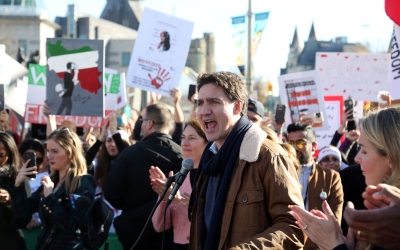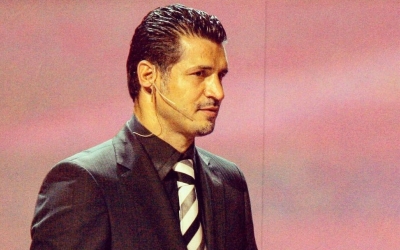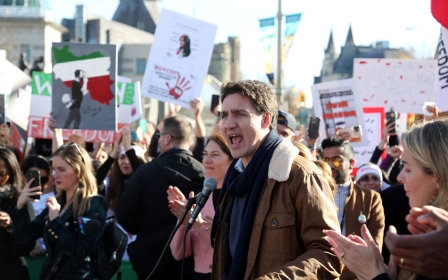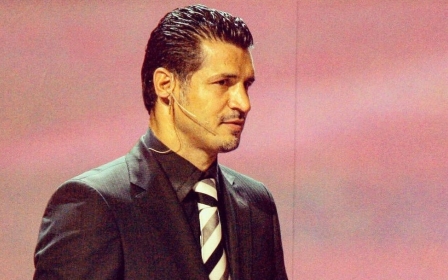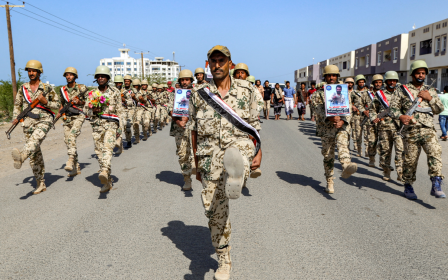Iran protests: Court issues second death sentence over unrest
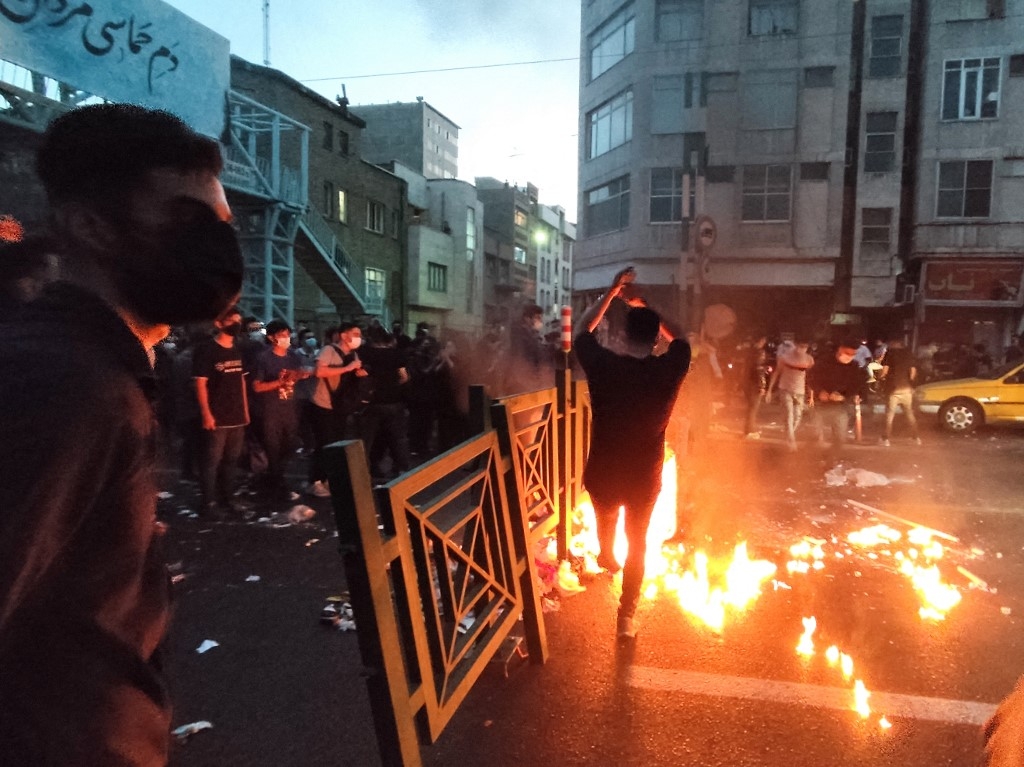
Iran said on Wednesday it had issued a death sentence - its second in three days - over continuing protests regarding the death of Mahsa Amini in custody, as the latest violence left several protesters and members of the security forces dead.
Amini, a 22-year-old Iranian woman of Kurdish origin, died on 16 September in the custody of the notorious morality police after her arrest for an alleged breach of Iran's dress code for women.
Protests have now entered a third month and intensified overnight on the anniversary of a lethal 2019 crackdown.
"We'll fight! We'll die! We'll take back Iran!" dozens of protesters could be heard chanting around a bonfire on a Tehran street, in a video published by the 1500tasvir social media monitor.
Bazaar shops were shuttered and students boycotted class before people hit the streets after dark, chanting anti-government slogans and braving tear gas, according to videos posted online.
New MEE newsletter: Jerusalem Dispatch
Sign up to get the latest insights and analysis on Israel-Palestine, alongside Turkey Unpacked and other MEE newsletters
State media said "rioters" - a term used by officials to describe protesters - killed two members of the Revolutionary Guards and a member of its Basij paramilitary force on Tuesday.
In a widely shared video verified by AFP, security forces appeared to open fire on dozens of commuters at a Tehran metro station, causing them to scramble and fall over each other on the platform.
Organisers of the latest protests have called for three days of actions to commemorate hundreds killed in the "Bloody Aban" - or Bloody November - demonstrations that erupted on 15 November 2019 after a shock decision to hike fuel prices.
The 1500tasvir monitor said families of those killed in the 2019 crackdown "were forced to cancel the ceremonies" as a result of "the Islamic republic's threats and pressure".
Guards killed
Iranian authorities have struggled to contain the protests, which have seen women remove and burn their headscarves and face off with security forces on the street.
Revolutionary Guards Colonel Reza Almasi was shot dead in Bukan, a city in Amini's home province of Kurdistan, and another Guards member, Reza Azabar, was gunned down in Kamyaran, a Kurdish majority city in West Azerbaijan province, the official IRNA news agency reported.
The Basij member died after being hit by a Molotov cocktail in the southern city of Shiraz, it added.
Three protesters have been killed, two in Sanandaj and one in Kamyaran by direct fire from government forces, the Oslo-based rights group Hengaw said.
The unrest was fanned by fury over the dress rules for women, but has grown into a broad movement against the theocracy that has ruled Iran since the 1979 Islamic Revolution.
It has shown no sign of abating despite the authorities' use of lethal force and a campaign of mass arrests that has snared thousands of activists, journalists and lawyers.
The Oslo-based group Iran Human Rights (IHR) said on Saturday that security forces had killed at least 326 people, including 43 children and 25 women, in the crackdown on the protests.
IHR said at least 15,000 people have been arrested, a figure the Iranian authorities have denied.
More death sentences expected
Iran's judiciary said a revolutionary court on Tuesday handed down a second death sentence over the "riots" that have rocked the country since Amini's death.
The unnamed defendant was accused of "terrorising people in the street using a bladed weapon, setting fire to the motorcycle of a citizen, and attacking a person with a knife", the judiciary's Mizan Online website reported.
'Protesters don't have access to lawyers in the interrogation phase, they are subjected to torture to give false confessions and sentenced based on the confessions by the revolutionary courts'
- Mahmood Amiry-Moghaddam, IHR
It came three days after a court issued the first death sentence in connection with the protest movement.
Five others have been sentenced to prison terms of between five and 10 years for "gathering and conspiring to commit crimes against national security and disturbing public order", Mizan said.
IHR director Mahmood Amiry-Moghaddam said the second death sentence was expected and that more are likely to be announced "one by one to minimise the reactions".
"We strongly condemn the death sentences issued by the Islamic republic judiciary, which is part of the oppressive regime and not an independent judicial system," he told AFP.
"Protesters don't have access to lawyers in the interrogation phase, they are subjected to physical and mental torture to give false confessions and sentenced based on the confessions by the revolutionary courts.
"The international community must send a strong warning to the Islamic Republic that execution of protesters will have severe consequences.
"We fear mass executions, unless the political cost of executions increases significantly."
French intelligence agents
Earlier this month, Iran's President Ebrahim Raisi said the country's cities were "safe and sound" after what he called a failed attempt by the United States to repeat the 2011 Arab uprisings in Iran.
Several French intelligence agents have been arrested in relation to the protests, Iran's Interior Minister Ahmad Vahidi told state TV on Wednesday.
"People of other nationalities were arrested in the riots, some of whom played a big role," Vahidi said.
"There were elements from the French intelligence agency and they will be dealt with according to the law."
France's foreign ministry did not immediately respond to a request from AFP for comment.
Last week, France's Foreign Minister Catherine Colonna said a total of seven French nationals had been detained in Iran.
Iran is being increasingly aggressive towards France by detaining its citizens, France's President Emmanuel Macron said on Wednesday, adding that Tehran was also destabilising the region with aggressive actions.
"I see an increasing aggressiveness from Iran towards us with its unacceptable hostage-taking [and] a regional aggressiveness... with extremely aggressive acts in the last few days on Iraqi soil," Macron told reporters at the end of a G20 leaders summit in Indonesia.
"I urge Iran to return to calm and a spirit of cooperation. I call it to respect regional stability and also French citizens."
At least two people were killed and 10 wounded on Monday when rockets and drones hit the headquarters of Iranian Kurdish parties in the autonomous Kurdish region of neighbouring Iraq.
Iran's semi-official Fars news agency said the country's Revolutionary Guards had attacked the bases of "terrorist groups" there.
Middle East Eye delivers independent and unrivalled coverage and analysis of the Middle East, North Africa and beyond. To learn more about republishing this content and the associated fees, please fill out this form. More about MEE can be found here.


